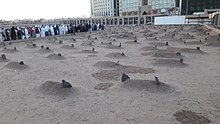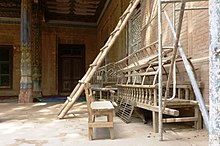Islamic funeral
This article needs attention from an expert in Islam. Please add a reason or a talk parameter to this template to explain the issue with the article. (April 2024) |
| Part of a series on |
| Islamic jurisprudence (fiqh) |
|---|
| Islamic studies |


Funerals and funeral prayers in Islam (
Upon receiving news of the death
Upon receiving news of death of someone or during calamity, the following part of Chapter 2, verse 156 is commonly recited:
إِنَّا ِلِلَّٰهِ وَإِنَّا إِلَيْهِ رَاجِعُونَ
ʾinnā li-llāhi wa-ʾinnā ʾilayhi rājiʿūna
"Indeed, we belong to Allah, and indeed, to Him we return."
Common Islamic burial rituals

Burial rituals should normally take place as soon as possible and include:[5]
- Collective bathing of the dead body,[6] except in extraordinary circumstances, as in the battle of Uhud.[7]
- Enshrouding the dead body in a white cotton or linen cloth.[8]
- Funeral prayer (صلاة الجنازة).[9]
- Burial of the dead body in a grave.
- Positioning the deceased so that the head is faced towards Mecca (Makkah Al-Mukarramah).
According to a hadith, "Recite Surah Yaseen over a dying person".
Bathing the body

The
and therefore a part of the Islamic sharia. This should occur as soon as possible after death, preferably within hours.Orthodox practice is to wash the body an odd number of times (at least once) with a cloth covering its
The "washers" are commonly adult members of the immediate family, who are of the same
leakage prior to surrendering it to mourners for washing.Shrouding
The corpse is typically wrapped in a simple plain cloth (the kafan). This is done to respect the dignity and privacy of the deceased with the family sometimes present. The specifics of this ritual, including the material, style, and colour of the cloth, may vary between regions. However, the
The body may be kept in this state for several hours, allowing well-wishers to pass on their respects and condolences.
Funeral prayer
After the announcement of death of the deceased person, the Muslims of the community gather to offer their collective prayers for the forgiveness of the dead. This prayer has been generally termed as the
The Janazah prayer is as follows:
- Like ruku' (bowing) and sujud(prostrating).
- Supplication for the deceased and mankind is recited.
- In extraordinary circumstances, the prayer can be postponed and prayed at a later time as was done in the Battle of Uhud.[9]
- The Janazah is considered fard kifaayah (communal obligation), meaning that only a few people have to do it, but everyone is considered sinful if no one prays it. It is prayed upon the death of an adult Muslim in the community.[14][15]
Burial



Following washing, shrouding and prayer, the body is then taken for burial (al-Dafin). The exact manner, customs and style of the
The grave should be perpendicular to the direction of the Qibla (i.e. Mecca) so that the body, placed in the grave without a coffin (merely wrapped in kafan) lying on its right side, faces the Qibla.[18] Grave markers should be raised, not more than about 30 centimetres (12 in) above the ground, so that the grave will neither be walked nor sat on. Grave markers are simple, because outwardly lavish displays are discouraged in Islam. Graves are frequently marked only with a simple wreath, if at all. However, it is becoming more common for family members to erect grave monuments.[citation needed]
In
Three fist-sized spheres of hand-packed soil prepared beforehand by the gravediggers are used to prop up the corpse, one under the head, one under the chin and one under the shoulder. The lowering of the corpse and positioning of the soil-balls is done by the next of kin. In the case of a deceased husband, a male brother or brother-in-law usually performs this task. In the case of a deceased wife, the husband undertakes this if physically able to. If the husband is elderly, then the eldest son (or son-in-law) is responsible for lowering, alignment and propping the deceased.
Orthodoxy expects those present to symbolically pour three handfuls of soil into the grave while reciting a Quranic verse meaning, "We created you from it, and return you into it, and from it we will raise you a second time".[20] More prayers are then said, asking for forgiveness of the deceased, and reminding the dead of their profession of faith.

The corpse is then fully buried by the gravediggers, who may stamp or pat down the earth to shape. Commonly, the eldest male will supervise. After the burial, those gathered pay their last respects to the dead by collectively praying for the forgiveness of the dead. This collective prayer is the last formal one for the dead. In some cultures such as
Mourning
According to
Grief at the death of a loved one and weeping for the dead is normal and acceptable.[24]
Pre-Islamic practices of wailing were instrumental in illustrating the role that women played in Islam. The act of lamentation came to represent Jahiliya behavior, or contrary to ideal Islamic behavior according to Muhammad. Loud grieving was inappropriate and was a viewed as questioning God. Women were portrayed as emotional and unable to control themselves when grieving. However, later Muhammad lost his son, and established the difference between grieving and crying. Outward and loud grief was inappropriate, whereas crying was appropriate.[25]
Sunni Islam expects expressions of grief to remain dignified, prohibiting loud wailing or mourning in a loud voice, shrieking, beating the chest and cheeks, tearing hair or clothes, breaking objects, scratching faces or speaking phrases that make a Muslim lose faith[clarify] (such as challenging the power of God e.g. "If God exists and is just, he would not allow such injustice"). Grieving is allowed as part of the funerary rites to allow one to come to terms with the loss of a person passing away as long as it respects Allah.[26]
Directives for widows
The Qur'an prohibits widows to engage themselves for four lunar months and ten days, after the death of their husbands. According to the Qur'an:
And those of you who die and leave widows behind, they should keep themselves in waiting for four months and ten days. Then when they have fulfilled their term, there is no blame on you about what they do with themselves in accordance with the norms [of society]. And Allah is well acquainted with what you do. And there is also no blame on you if you tacitly send a marriage proposal to these women or hold it in your hearts. Allah knows that you would definitely talk to them. [Do so] but do not make a secret contract. Of course you can say something in accordance with the norms [of the society]. And do not decide to marry until the law reaches its term. And know that Allah has knowledge of what is in your hearts; so be fearful of Him and know that Allah is Most forgiving and Most Forbearing.
Islamic scholars consider this directive a balance between the mourning of a husband's death and the protection of a widow from cultural or societal censure if she became interested in remarrying after her husband's death, often an economic necessity.[27] This provision also operates to protect the property rights of the unborn, as the duration is enough to ascertain whether a widow is pregnant or not.[28]
Husbands are recommended to make a
And those of you who die and leave widows should bequeath for their widows a year's provision and [bequeath] that [in this period] they shall not be turned out of their residences; but if they themselves leave the residence, there is no blame on you for what they do with themselves according to the norms of society. And Allah is Exalted in Power, Wise.
See also
- Islamic view of death
- Burial at sea in Islam
- The Majmuna Stone, a 12th-century Islamic marble tombstone
- Wadi-us-Salaam, an Islamic cemetery and the largest cemetery in the world
- Pocong, a ghost shrouded in kafan from Javanese folklore
References
- ^ Rema Rahman (25 October 2011). "Who, What, Why: What are the burial customs in Islam?". BBC News. Retrieved 16 October 2017.
- ISSN 0030-2228.
- PMID 11202669.
Mutilation, and thus cremation, is strictly prohibited in Islam.
- ^ "Cremation Services". Retrieved 9 February 2019.
In eastern religions such as Hinduism, Jainism, Sikhism and Buddhism cremation is mandated, while in Islam it is strictly forbidden.
- ^ Ghamidi (2001),Customs and Behavioral Laws Archived 2013-09-23 at the Wayback Machine
- ^ Sahih al-Bukhari 1254
- ^ Sahih al-Bukhari 1346
- ^ Sahih Muslim 943
- ^ a b Ghamidi, Various types of the prayer Archived 2013-09-23 at the Wayback Machine
- ^ Sahih Muslim Volume 2, Book 23, Number 344-358 Archived 2010-08-19 at the Wayback Machine
- ^ Nesa, Baduroon. "The Washing and Shrouding of the Deceased". Al-Jazeerah.nfo. Dr. Hassan Ali El-Najjar. Retrieved 17 February 2012.
- ^ Sahih Muslim Volume 2, Book 23, Number 353-358 Archived 2010-08-19 at the Wayback Machine
- ^ Sahih Muslim Volume 2, Book 23, Number 404 Archived 2010-08-19 at the Wayback Machine
- ^ Sahih Muslim Volume 2, Book 23, Number 359 Archived 2010-08-19 at the Wayback Machine
- ^ Saalih Al-Munajjid, Shaykh Muhammad. "The funeral prayer is fard kifaayah". IslamQA. Retrieved 4 July 2023.
- ^ "Fiqh-us-Sunnah, Volume 4: Burial". www.islamicstudies.info. Retrieved 24 April 2024.
- ^ "SAHIH BUKHARI, BOOK 23: Funerals (Al-Janaa'iz)". www.iium.edu.my. Retrieved 24 April 2024.
- ISBN 0-915957-72-8.
- ^ Sahih Muslim Volume 2, Book 23, Number 368 Archived 2010-08-19 at the Wayback Machine
- ^ Quran 20:55; compare "Dust thou art, and unto dust thou shalt return" (Genesis 3:19)
- ^ Sahih Muslim Volume 2, Book 23, Number 369–371 Archived 2010-08-19 at the Wayback Machine
- ^ Quran 2:234
- ^ "CRCC: Center for Muslim-Jewish Engagement: Resources: Religious Texts". Archived from the original on 19 August 2010. Retrieved 4 September 2010.
- ^ Sahih Muslim Volume 2, Book 23, Number 391 Archived 2010-08-19 at the Wayback Machine
- )
- ^ Sahih Muslim Volume 2, Book 23, Number 375–393 Archived 2010-08-19 at the Wayback Machine
- ^ Islahi (1986), p. 546
- Renaissance. March, 2004
Bibliography
- OCLC 52901690.
- Tadabbur-i-Qur'an, 2nd ed., vol. 1, (Lahore: Faran Foundation, 1986)
